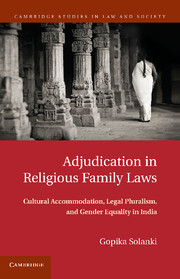 Adjudication in Religious Family Laws
Adjudication in Religious Family Laws Book contents
- Frontmatter
- Contents
- List of Figures
- List of Tables
- Preface
- Acknowledgments
- Abbreviations
- Glossary
- 1 Introduction
- 2 The Shared Adjudication Model
- 3 State Law and the Adjudication Process
- 4 Making and Unmaking the Conjugal Family
- 5 Juristic Diversity, Contestations over “Islamic Law,” and Women's Rights
- 6 Conclusion
- Appendix
- Bibliography
- Index
- CAMBRIDGE STUDIES IN LAW AND SOCIETY
Preface
Published online by Cambridge University Press: 03 May 2011
- Frontmatter
- Contents
- List of Figures
- List of Tables
- Preface
- Acknowledgments
- Abbreviations
- Glossary
- 1 Introduction
- 2 The Shared Adjudication Model
- 3 State Law and the Adjudication Process
- 4 Making and Unmaking the Conjugal Family
- 5 Juristic Diversity, Contestations over “Islamic Law,” and Women's Rights
- 6 Conclusion
- Appendix
- Bibliography
- Index
- CAMBRIDGE STUDIES IN LAW AND SOCIETY
Summary
States and religious groups struggle to control the family in multireligious and multiethnic societies, and as a result, these societies face the challenge of constructing institutional arrangements that can facilitate equality between diverse ethno-religious groups and ensure gender justice within these groups. Responding to this issue, many postcolonial states have not enacted uniform civil laws to govern the family, but have adopted legal pluralism and arrived at accommodative agreements with religious groups in the regulation of the family. Scholars have argued that these states' recognition of religious family laws essentializes religious groups, fuels religious extremism, leads to interreligious conflict, and prevents the construction of the political community. Feminists add that states barter women's rights to accommodate religious groups and thus violate women's human rights in the family.
Drawing on these debates, this book addresses the questions: How do societies resolve the critical tension between cultural autonomy and gender equality in contestations around family law? How do they design group rights without cementing group boundaries? I turn to legal institutional arrangements adopted by postcolonial states to answer this question and study what I call the “shared adjudication model” adopted in India. The Indian state recognizes religious laws of Hindus and Muslims, and shares its adjudicative authority with internally heterogeneous religious communities and other societal sources in matters of marriage and divorce.
- Type
- Chapter
- Information
- Adjudication in Religious Family LawsCultural Accommodation, Legal Pluralism, and Gender Equality in India, pp. xxi - xxivPublisher: Cambridge University PressPrint publication year: 2011
